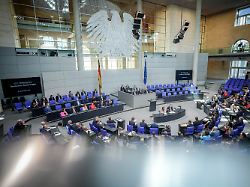Implementation of EU directives
Bundestag decides on energy saving requirements
September 21, 2023, 6:59 p.m
Energy consumption in Germany is expected to fall significantly in the coming years. To this end, the Energy Efficiency Act sets specific requirements for individual sectors. In the second attempt, the project passed the Bundestag. In addition to a lot of encouragement, there is also criticism. The IFO Institute speaks of a “growth killer”.
According to the Federal Climate Ministry, in order to make the energy transition successful, not only must the expansion of renewables be promoted, but energy consumption in Germany must also be reduced. In order to achieve this, Robert Habeck’s ministry launched the Energy Efficiency Act in the spring, which has now been passed by the Bundestag. This includes savings for all sectors from industry to buildings. The law implements the amendment to the European Energy Efficiency Directive. The vote was originally scheduled for July 7th, but the minimum number of 369 MPs in the Bundestag plenary were not present for the vote at that time.
Overall, final energy consumption in Germany is expected to fall by 26.5 percent by 2030 compared to 2008. By 2040, 39 percent less energy should be consumed, and by 2045 even 45 percent. A role model is intended for the public sector: According to the text of the law, public bodies with an energy consumption of one gigawatt hour or more must save two percent of their energy annually by 2045. For example, waste heat should be used more and water cooling should be used instead of air in new data centers.
“Energy efficiency is an important component of the energy transition and central for companies,” said Green MP Katrin Uhlig. This law creates clear structures and planning security for companies. However, the opposition criticized sharply. CDU MP Thomas Gebhart complained about a “bureaucratic mess that will put even more strain on companies in our country, without any discernible benefit.” Companies would be given “small-scale regulations” – this is the opposite of what Germany needs. An amendment from the Union faction to reduce the electricity tax to the minimum permitted under European law did not find a majority in parliament.
“Milestone” or “growth killer”?
The energy industry considers the law to be “very ambitious” and has already praised measures such as the obligation to set up an energy or environmental management system for consumption of more than 7.5 gigawatt hours (GWh). However, the Federal Association of the Energy and Water Industry is critical of the requirements for data centers, as the special requirements of critical infrastructure companies, which include companies in the energy and water industry, were not taken into account. However, the BDEW also demanded that the savings measures not lead to further financial or bureaucratic burdens for people and the economy.
The digital association Bitkom praised the project as a “milestone” for climate-neutral data centers. However, the association is critical of the significant tightening of energy consumption effectiveness. It will not be possible to achieve this in practical implementation in many places.
According to the German Business Initiative for Energy Efficiency, the law will bring progress for the economy, the population and climate protection. In addition to reliable targets, there is an urgent need to tighten up concrete measures, as there is already an acute collapse in demand for building renovations and efficiency measures in companies. The IFO Institute has warned that the law could become a “growth killer” as it caps the country’s total energy consumption. If energy efficiency grows as quickly as before in the future, the economy would have to shrink by 14 percent to achieve the target, according to the institute’s calculations.
